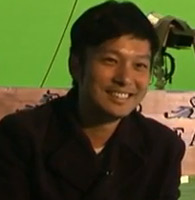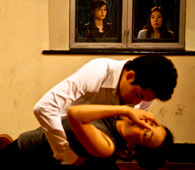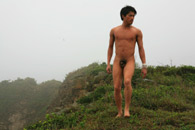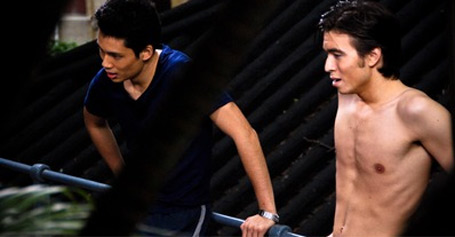To readers following LGBT cinema in Hong Kong, director and scriptwriter Scud should be no stranger. Shocking the city with his very homoerotic debut City without Baseball, Scud has since produced two more films concerning homosexuality: Permanent Residence and Amphetamine.





“All the love films I watch seem to have happy endings; but in my observation, many romances actually end with sadness or even disaster,” says Scud.
Only by watching his films does one realise the darkness behind the director’s almost cherubic face. “I am not attempting to be particularly sensational. All these cases actually happened!” He says.
“The fact that these romances end badly doesn’t mean that they are inferior. In fact, these stories deserve to be told. When I was filming at the location where one of the film’s real-life character took his life, I felt that he was trying to say something through the film.”
Realism is Scud’s guiding philosophy in filmmaking. He abides by the principle, even when it causes controversy or danger. Many of the scenes in his new film were shot at locations where the real-life cases he portrays took place.
“One of the locations we shot at is an uninhabited island, where a mountain-climber (nicknamed ‘Spider’) fled after killing and beheading his lover. In one of the scenes, the character playing Spider had to walk along a cliff without harness. That was really scary.”
Another memorable scene in the movie shows a woman performing oral sex on her boyfriend.
“Everyone asked why it was so real. The secret is: It was all real!” says Scud with a smile. “Linda So (playing the girlfriend) was at first concerned if she was going to be able to do it – she was. The scene took five takes to film, and Haze Leung (who played the boyfriend) quipped, 'One more take and I would have come.' When we where done, Linda and Haze collapsed in laughter. They are real professionals.”
The above scene was not only difficult to film; it has also hindered the film’s commercial release. The Hong Kong censor (the Television and Licensing Authority – TELA) requested 11 cuts as a pre-condition for showing the film in cinemas. One of the censor’s many objections is the appearance of (or the suspicion of the appearance of) male sexual organs.
In view of the difficulties, I am tempted to ask if all the nudity is necessary. “Very much so,” says Scud.
“Sucking is an important symbol in the film. It is a selfless act; in sucking, one is pleasuring only the other person without reward for oneself. You suck only when you are in love.” The sucking scene is not Scud’s biggest worry.
“The incest in the film is more difficult. The censor objected to the entire portrayal an incestuous relationship in the film. I can cut scenes, but I can’t cut a whole story out of the film.”
This is not Scud’s first run-in with the Hong Kong censor. His last film, Amphetamine, created much controversy when the censor asked him to cut a homosexual rape scene. Scud refused, and the film was released with intermittent black-outs in place of cuts. The incident was not without a silver-lining.
“Since the standoff with Amphetamine, they have become much more communicative. Although our arguments are tense, there has been a real exchange of minds. In time, I hope our differences will narrow.”
With the Hong Kong censors, Scud has won one small victory: the film’s trailer has been approved. “We have three trailers in three categories, to be shown along with different categories of films.”
As for the Taiwan censors, Scud has decided to put aside his fight with them at the moment, even though the Taiwan authorities demanded only five cuts. “One fight at a time,” said Scud.
It is still a disappointment to Scud that the film cannot debut in Asia because of censorship issues. Love Actually... Sucks! was first shown this month at QFest, an LGBT film festival in Philadelphia, USA. The film and Scud’s last production, Amphetamine, were the festival’s only entries from Asia. At the festival, Scud came to an initial agreement with a major distributor of independent films in the US. “In a way, overseas sales lessen the hold Hong Kong censors have on me. Even if the film is banned in Hong Kong, my fans will be able to order DVDs from the US or from Europe.”
That scenario, though, is less than ideal. The cinematic beauty of Scud’s new film is best appreciated on big scenes in cinemas. Unique for a film dealing with such violent themes, its cinematography is polished, more than that, actually beautiful.
“I cannot film something that is not beautiful, my philosophy prevents that.” explains Scud.
“Thanks must also go to William Cheung, who did the cutting and colouring. He gave a very special colour tone to the film.” (William Cheung is the artistic director behind all of director Wong Kar-wai’s films). The beauty of the film is also enhanced by its score, composed by Yu Yat Yiu, a member of the Hong Kong music production company People Mountain People Sea. The rousing, joyful scores often contradict the tragedies portrayed in the film. “That has to do with East-West cultural differences. In the East, a romance that ends in tragedy may not be that bad, if the lovers can unite after death, or in their next lives,” Scud added.
If Scud is contemplating his next life, it is not because he has to little to do in his current life. Two more films are already in the pipeline. His next film, Voyage, will be in English and will be filmed in eight countries. The other, Life as an Artist, will complete the trilogy that has started with Permanent Residence and Amphetamine. With so much to look forward to, let us hope that no censor stops Scud from carrying on making films that stimulate, challenge and provoke us.

